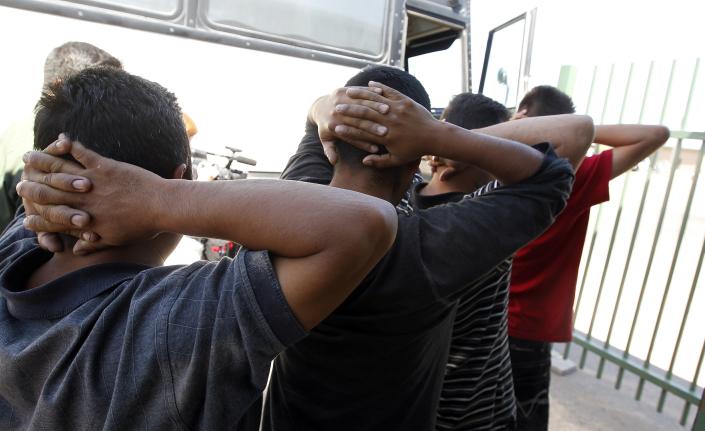A big loophole in Holder’s new racial profiling guidelines—the border
Outgoing attorney general loses fight with DHS

Outgoing Attorney General Eric Holder expressed disappointment Monday that the U.S. border is exempt from his new racial profiling ban, after the Department of Homeland Security rejected his plan as too risky.
The Justice Department’s new guidance, released Monday, forbids federal law enforcement officers from using race, ethnicity, religion, sexual orientation or gender identity as a factor when deciding whom to stop or arrest and in FBI national security investigations — a significant expansion of the Bush-era ban on racial profiling and a keystone of Holder’s legacy.
The broader protections against profiling have been in the works for five years, but were released amid protests over several racially charged, high-profile police killings. "Particularly in light of certain recent incidents we've seen at the local level, and the widespread concerns about trust in the criminal justice process which so many have raised throughout the nation, it's imperative that we take every possible action to institute strong and sound policing practices," Holder, the country’s first black attorney general, said in a statement.
A Justice Department official told reporters that the new guidance would be “one of the signature accomplishments” of Holder’s tenure.
But a big footnote in the policy, which was won by the Department of Homeland Security after weeks of negotiations, is marring the accomplishment, and frustrating Holder.
In a 12-page memo announcing the guidance, the Justice Department mentioned in a footnote that the new rules would not apply to “to interdiction activities in the vicinity of the border, or to protective, inspection, or screening activities.” The CIA and Transportation and Security Administration (TSA) agents will also be exempt.
In a conference call with law enforcement officials Monday afternoon, the attorney general “made it clear that he was quite disappointed” with that concession, one person on the call told Yahoo News on the condition of anonymity. When asked why the new policy wouldn’t apply to DHS, Holder said that the agency, which is led by Jeh Johnson, had pushed back on the racial profiling policy, telling him it needed to be able to use race as a factor in some of its law enforcement activities to keep the nation safe. The source said Holder deployed some lighthearted sarcasm to convey his disappointment, asking, “What do I know? I’m just the attorney general of the United States." A Justice Department official said that the attorney general was not being sarcastic and that he was sincerely explaining to the law enforcement officials that he can’t tell other agencies that aren’t under his purview what to do.

The concession to Homeland Security is sizable. Immigration agents can still use race as a factor in deciding to stop people and question them about their immigration status up to 100 miles from any U.S. border. TSA agents are also exempt from the racial profiling rules at every airport in the country. The agencies say they use race as a factor in very limited circumstances.
Immigration advocates were angry about the DHS exceptions. Rich Stoltz, the president of One America, an immigrant rights nonprofit organization, called the exemptions for Customs and Border Patrol and other agencies “unacceptable.”
In 1975, the Supreme Court unanimously held that border patrol agents can racially profile Latinos, on the reasoning that a majority of undocumented immigrants crossing the southern border are of Hispanic descent. The Justice Department’s move maintains this status quo, though DHS says it has strict guidelines about when race can be used as a factor.
Police officers cannot ever use race or ethnicity as the sole basis for making an arrest or stop, but it can be used as one factor in their calculus, according to the Supreme Court.
Jack Chin, a law professor at the University of California at Davis, said he thinks creating exceptions for some federal law enforcement to racially profile will muddy the waters. “It seems arbitrary: Why is racial profiling OK in one circumstance and not OK in other circumstances?" Chin said. “It’s a compromise of the principle that I think will make it much harder to enforce.”
The Justice Department’s new standards will also apply to local law enforcement officials when they are operating in task forces with federal agents, and are meant to serve as a model for the states, 20 of which do not explicitly ban racial profiling. The new guidance also requires the federal agencies to keep records of complaints they receive about racial profiling, and to undergo new training.
This first rules banning racial profiling were issued in 2003, under Attorney General John Ashcroft, but included a loophole for the border as well as national security generally. Holder’s guidance expands on this to include sexual identity and religion as protected categories, in addition to race and ethnicity, and narrows the “national security” loophole.



